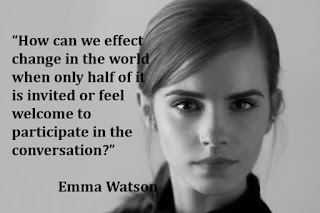Who is in the limelight
Garza describes in
her article how the beginning of the #BlackLivesMatter slogan became a media
sensation. What is sad, however, is that Garza’s creation of this hashtag, with
her two sisters, was twisted and distorted by the media and those taking their
slogan and using it to represent something else. Garza discusses how in distorting
the name and taking out “Black” contributes to the erasing and under-representation
of black lives. Many people take offense to this slogan because they see it as
saying other lives don’t matter. This blatantly false presumption of the slogan
is perhaps contributed to the fact that people don’t try and understand the
origin and importance behind the meaning. This takes away what Garza and her
sisters wanted to call attention to in the first place. Not only this, but
queer black women were marginalized within the Black Lives Matter movement.
“It is an
acknowledgement Black poverty and genocide is state violence.” In this
statement and through her slogan, Garza is pointing out the inequalities that
black people face, “not ALL people”. It is ok that this is a specific title
because the injustices that black people face are different than the injustices
faced by any other group. To me, this is the most important distinction in the article
because the Black Lives Matter movement is not saying black lives are valued
over any other life, but that they are fighting in solidarity with all
oppressed people. Garza wants Black Lives Matter to be recognized as something
good for everyone. We have seen these desires come to fruition through the
positive backlash with other oppressed groups taking similar tactics as those
in Black Lives Matter. Garza also discusses the importance of recognizing the
history, background, and roots of a movement. I think this demand for acknowledgment
is very important. This article has made me more aware and conscientious of my own
background.
I found Douglas’s
article to be similar to the ideas expressed in Gaga feminism. Just as
Halberstam uses gaga as a symbol of the new era feminism, so too did Douglas
use the iconic Spice girls as a symbol for feminism during that era. However, the
problem with using pop-culture icons as feminist symbols is that these icons
will not always be known or recognized. Not only this, but feminism is a
product of its time and constantly changing, so the feminist desires and ideals
during the Spice girls’ era is very different from feminism today. This being
said, I do think assigning these icons as symbols of feminism can have a very
positive effect on the youth. Often times, these icons and celebrities are the
people that children look up to and learn from, which is why I feel it is so
prominent to promote feminist groups and people in the media. Another part of
Douglas’s article which I found interesting was when she describes how shocking
it was during the mid-late 2000’s that women were running for president, becoming
C.E.Os. and attorneys. If I were Halberstam I would question as to why these
things are shocking to people during this time. Douglas remarks that although
women had gained greater positions in the workforce during that time period, the
most popular jobs for women were still those of secretaries, elementary
teachers, cashiers, etc.
Douglas lays out an interesting concept that I had
never thought about before: that advertisements convince women they have
achieved so much—as displayed especially through TV shows and movies—even
though in reality they haven’t. This distortion by the media of real experience
vs. advertised experience is similar to Garza’s article in that the Black Lives
Matter slogan too was distorted by the media.
-Jane B




I made a lot of similar points to you in my blog post, but didn't have the realization that you did of how Douglas and Halberstam compare. As you said, Halberstam would wonder why the aspirations of women were surprising, as one of his "what if?" questions. This proves that Halberstam is even more radical and questioning on the spectrum of different feminisms. Everything you say about distortion by the media, as it relates to Douglas and Garza, is so true as well!!
ReplyDelete